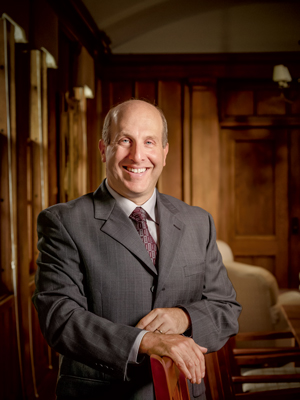Oberlin Alumni Magazine
Spring 2014 Vol. 109 No. 2
From the President
Inspiration at the Summit
I was honored to represent Oberlin on January 16 at the College Opportunity Summit meeting at the White House. The participants—President Barack Obama and the First Lady, other college and university presidents, top government officials, and leaders from the business and nonprofit sectors—gathered to focus on the challenges faced by lower income students in getting into and graduating from college.
The president and Michelle Obama spoke, as did many other members of the administration, including Education Secretary Arne Duncan. The speakers covered the spectrum of the process of getting into college—admissions and aid, pipeline programs, and academic support and development.

There was broad agreement on several key points. Higher education is an indispensable pillar of our democracy, our economy, and our way of life. Our country must affirm the value of higher education as an important national priority and make sure that access to a quality college education is a viable option for every student seeking a degree.
But achieving those goals will not be easy. We learned that only 9 percent of those born into the lowest quartile of American families from 1979 to 1982 attended and graduated from college. We also were reminded of the significant barriers that exist for many students in public high schools. I recall hearing that an average urban public high school has only one counselor for more than 1,000 students—and that person advises students on issues such as truancy and family problems in addition to providing college counseling. By comparison, the national average is one counselor for every 470 high school students.
The summit has special resonance for me because of Oberlin’s history and our fundamental belief in providing worthy students, regardless of their socio-economic circumstances, with access to our educational excellence.
To that end, we recently partnered with Raise Labs, a new program that provides micro-scholarships to students at urban public schools. And we have extraordinary ongoing commitments to the Posse Foundation; the Robinson Scholars, our scholarship program for Oberlin High School students; Questbridge; and the Ninde Scholars Program, which provides academic enrichment and college-preparation services to young people in Oberlin.
Our commitment to financial aid—the overwhelming majority of our students receive need-based financial aid—rivals that of any peer institution. The faculty, staff, and students who work in Oberlin’s K-12 schools and elsewhere strengthen potential applicants to this and other colleges and universities. Every day, I meet or hear from alumni who are dedicating their lives to K-12 education and helping prospective college students who face barriers.
At Oberlin, we also have highly dedicated faculty members who work, along with our academic support, residential life, and other staff members, to ensure that our students succeed once they are admitted.
I was inspired by the summit. I know that all of us share the goal of ensuring that Oberlin continues to open doors for students from lower income families. That is why our comprehensive campaign, Oberlin Illuminate, highlights scholarships and financial aid as its top priority. Even small amounts can make a huge difference in the lives of students. Thanks to the many of you who contribute, whether through the senior gift, the faculty and staff campaign, or the Annual Fund, to help make this vision of access and opportunity a reality. While we all realize that there is so much work to be done—by all of us—we can take pride in what we have done and will do at Oberlin.
Marvin Krislov
President, Oberlin College

Want to Respond?
Send us a letter-to-the-editor or leave a comment below. The comments section is to encourage lively discourse. Feel free to be spirited, but don't be abusive. The Oberlin Alumni Magazine reserves the right to delete posts it deems inappropriate.